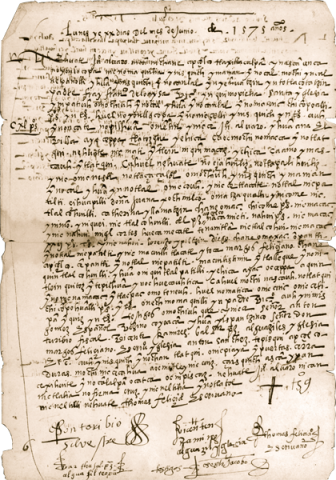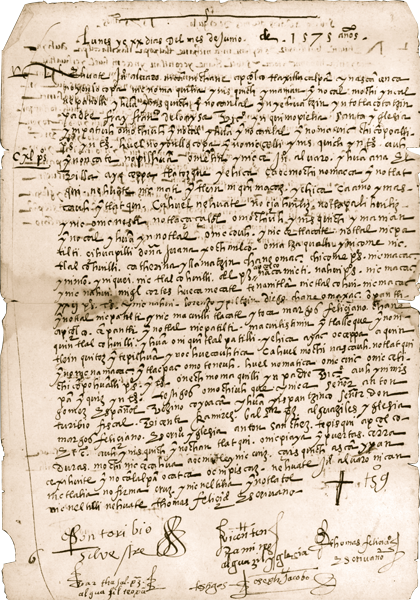Juan Alvaro sells land to the Dominican monastery, Coyoacan region, 1575.
This manuscript was first published in Beyond the Codices, eds. Arthur J.O. Anderson, Frances Berdan, and James Lockhart (Los Angeles: UCLA Latin American Center, 1976), Doc. 20, 112–115. However, the transcription, translation, and a new introduction presented here come from Lockhart's personal papers.
The original manuscript is located in the McAfee Collection, Special Collections, UCLA Research Library.
[Introduction by James Lockhart:]
To sell land directly to a church was rare either for Spaniards or for indigenous people, donations being much more common and most common of all donations of income from properties remaining in lay hands. In this case the house and lands are probably located close to the church or its immediate support structure and will be used in the development of the Dominican order’s central facilities in Coyoacan (see also Beyond the Codices, Doc. 21). The transaction is large by indigenous standards and not small by any standards for a rural property exchange in the 1570s. One can look far in the records for a property sale worth as much as 140 pesos in cash.
Yet Juan Alvaro, the owner and seller, lacks either the title don borne by major nobles of the time or even any of the more prestigious surnames often seen with members of the officeholding group; nor is there any direct indication that he has held an office (notice that the Marcos Feliciano mentioned, though not officially involved, is still called church notary). One thing that we can see about him is that in effect he is a land entrepreneur. He has been accumulating and consolidating land through purchase and sale, specifically naming six holdings acquired from six different people, from an old woman without a second name who deals through her son-in-law, through a probably reasonably substantial tradesman, a butcher, and a local notary, to a high noblewomen (the doña Juana mentioned in line 18 is doña Juana de Guzmán, a member of the dynastic family of Coyoacan who married one of the rulers of Xochimilco; she is also in Doc. 4, the will of her brother don Juan de Guzmán). The prices he paid for three individual plots are modest, normal for the time: 4, 7, and 22 pesos; the other three plots he acquired through trading land he already had, but he considers them purchased as well. It looks as if Juan Alvaro made a very healthy profit on the transaction; the Dominicans must have set great value on the holding. The land is apparently contiguous and being cultivated as a block (an unusual arrangement in the Nahua world). Juan Alvaro has his house somewhere on it and speaks as though it all constitutes his house-land (callalli), which he has been actively cultivating, for he stipulates that he will harvest what he has presently planted on it. Any future claims on the part of the seller’s son and daughter are warded off on the grounds that through purchase and his own efforts he has created the property personally. Such statements are common, but rarely do they apply to the seller’s own house and house-land. Perhaps Juan Alvaro has yet other properties, and given the nature of his activity it is likely; in any case, the 140 pesos will go far to provide for his family.
We see here representatives of a rising family of notaries in Tomás and Marcos Feliciano. The document is cast in the fully competent and standardized mode, with close equivalents of much Spanish legal terminology and conventions, characteristic of Coyoacan after around 1560. The fiscal of the church is don Toribio Silvestre, who has acquired the don since 1557 (Doc. 12), an indication both of his personal advance and of the increasing prominence of the office of fiscal.
The reader will notice that although the land came from six people, it is given in the original as from five because two were counted as fourth.
-----
Juan Álvaro venda terrenos al monasterio dominicano, región de Coyoacán de 1575.
McAfee Colección, Colecciones Especiales, Biblioteca de Investigación de la UCLA.
VENDER la tierra directamente a una iglesia era raro, ya sea para los españoles o para las poblaciones indígenas, las donaciones siendo mucho más común y el más común de todas las donaciones venia de venta de las propiedades restantes en manos de laicos. En este caso, es probable que se encuentran la casa y las tierras cerca de la iglesia o de su estructura de soporte inmediato y serán utilizados en el desarrollo de las instalaciones centrales de la Orden Dominica en Coyoacán (ver también Más allá de los Códices (manuscritos), Doc. 21). La transacción es grande para los estándares indígenas y no son pequeñas en todos los sentidos para un cambio de propiedad rural en la década de 1570. Uno puede buscar muy lejos en los registros para encontrar una venta de bienes por valor de hasta 140 pesos en efectivo.
Sin embargo, Juan Álvaro, el propietario y el vendedor, carece de título de “don”, lo cual llevaban los nobles de la época, ni lleva cualquier apellido más prestigioso que se veia a menudo entre los miembros del grupo con cargos; tampoco existe la indicación directa de que él fue encargado de un puesto (observe que el mencionado, Marcos Feliciano, aunque no esté involucrado oficialmente, todavía se llama notario de la iglesia). Una cosa que podemos ver de él es que, en efecto, él es un empresario de la tierra. Él ha estado acumulando y concentrando tierras a través de la compra y venta, específicamente nombrando seis parcelas adquiridas de seis personas diferentes; de una anciana sin segundo nombre quien encarga a su yerno para hacer el negocio, de un comerciante probablemente razonablemente sustancial, de un carnicero, y de un notario local, hasta una noble de alta posición (la doña Juana mencionada en la línea 18 es la doña Juana de Guzmán, una miembro de familia de la dinastía de Coyoacán quien se casó con uno de los dirigentes de Xochimilco; ella aparece en el Doc 4 también, en el testamento de su hermano don Juan de Guzmán). Los precios que pagó por tres parcelas individuales son modestos, normal para la época: 4, 7 y 22 pesos; las otras tres parcelas fueron adquiridas de un cambio de tierras que ya tenían, pero él las considera como compradas también. Parece que Juan Álvaro hizo un beneficio muy saludable en la transacción; los dominicos debían de haber puesto un gran valor en la propiedad. La tierra es aparentemente contigua y siendo cultivada como un bloque (un arreglo inusual en el mundo nahua). Juan Álvaro tiene su casa en algún lugar en la propiedad y habla como si toda constituye su casa-tierra (callalli), que él ha estado cultivando activamente, porque estipula que va a cosechar lo que ha sembrado actualmente. Cualquier reclamo futuro por parte del hijo y la hija del vendedor están amparados sobre la base de que a través de la compra y de su propio esfuerzo, él ha creado la propiedad personalmente. Tales declaraciones son comunes, pero rara vez se aplican a la propia casa del vendedor y la casa-tierra. Tal vez Juan Álvaro tiene todavía otras propiedades, y dada la naturaleza de su actividad, es probable; que, en cualquier caso, los 140 pesos van a ir muy lejos para mantener a su familia.
Vemos aquí a los representantes de una familia creciente de notarios, Tomás y Marcos Feliciano. El documento esta emitido en un modo totalmente competente y estandarizado, con muchos estrechos equivalentes de terminología y convenciones jurídicos españoles, característico de Coyoacán después de alrededor de 1560. El fiscal de la iglesia es don Toribio Silvestre, que ha adquirido el don desde 1557 (Doc. 12), una indicación tanto de su avance personal y de la creciente importancia en la oficina del fiscal.
El lector se dará cuenta de que, aunque la tierra venga de seis personas, se da en el original como que viene de cinco porque dos fueron contadas como la cuarta.
[Introducción por James Lockhart; traducida al español por Melanie Hyers.]

